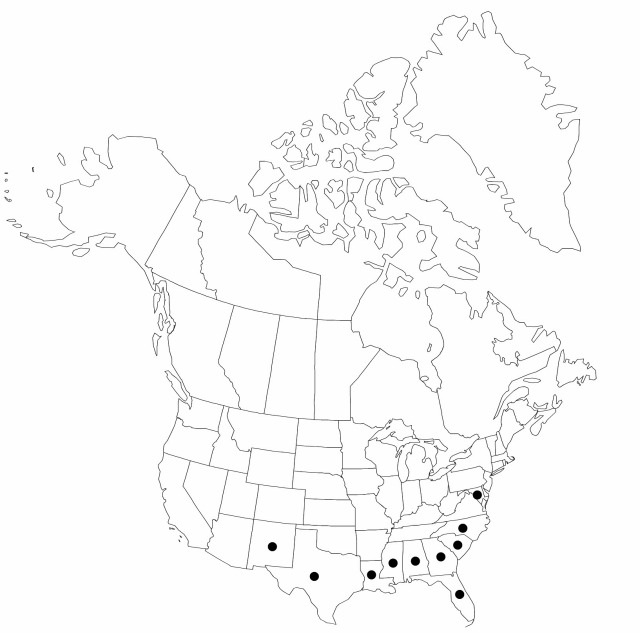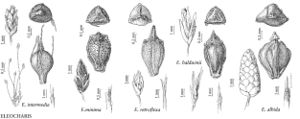Difference between revisions of "Eleocharis albida"
Ann. Lyceum Nat. Hist. New York. 3: 304. 1836.
FNA>Volume Importer |
FNA>Volume Importer |
Revision as of 19:07, 24 September 2019
Plants perennial; rhizomes soft, longer internodes 2–4 cm, cortex loose, scales fugaceous, 6 mm, thinly membranous and translucent. Culms not rooting at tips, terete, 10–40 cm, soft to firm, smooth. Leaves: distal leaf sheaths proximally brownish or sometimes reddish, distally stramineous to green. Spikelets ovoid to oblong-subcylindric, 4–12 × 2–3.5 mm, apex acute to rounded; proximal scale empty, clasping 1/2 of culm, like floral scales; subproximal 1 or 2 scales often empty; floral scales 20–100, 10 per mm of rachilla, entirely stramineous or sometimes red-brown, ovate, (1.5–)2–2.5 × 1.5 mm, apex broadly rounded, entire. Flowers: perianth bristles (5–)6(–8), brown, stout, the longer equaling achene or tubercle, retrorsely spinulose; stamens 3; anthers brown, 1 mm. Achenes falling with scales, obovoid, angles keeled, 0.8–1 × 0.7–0.8 mm, apex with short neck. Tubercles whitish to brown, mammillate to pyramidal, 0.2–0.3 × 0.3–0.35 mm, 1/3 or less as wide as achene.
Phenology: Fruiting summer.
Habitat: Coastal saltmarsh edges, sloughs, beaches, dune depressions, ditches
Elevation: 0 m
Distribution

Ala., Fla., Ga., La., Md., Miss., N.Mex., N.C., S.C., Tex., Mexico, Bermuda.
Discussion
In most spikelets, the bright brown stigmas contrast strikingly with the stramineous floral scales. We have not seen vouchers for H. K. Svenson’s (1937) reports of Eleocharis albida from Virginia. The collections we have seen from Maryland are from the 1800s.
Selected References
None.
